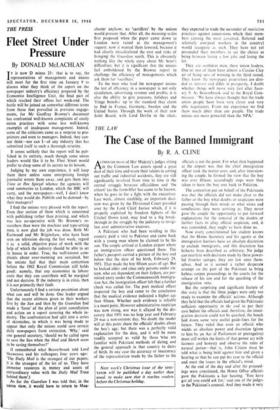Fleet Street Under Pressure
THE PRESS
By DONALD McLACHLAN
I T is now D minus 25: that is to say, the representatives of management and unions will meet for the first time on January 9 to discuss what they think of the report on the newspaper industry's efficiency prepared by the Economist Intelligence Unit, the final part of which reached their offices last week-end. The battle will be joined on somewhat different terms from those that prevailed in previous engage- ments, for Mr Geoffrey Browne's document has confronted well-known complaints of costly union practices with some less well-known examples of inadequate management. Indeed, some of the criticisms came as a surprise to pro- prietors and even to managers. Indeed, they can- not think—nor can I—of any industry that has submitted itself to such a thorough scrutiny.
It seems unlikely that the report will be pub- lished in its entirety, much though some union leaders would like it to be. Fleet Street would prefer to clasp some of its secrets to its bosom.
Judging by my own experience, it will keep them there unless some enterprising foreign journalist wrests them away, and gets them into Time or Der Spiegel whence the agencies will send summaries to London, which the BBC will carry, and the newspapers—well, I don't know what they would do. Publish and be damned—by their managers?
I find the unions very pleased with the report. Even that section of them which is concerned with publishing rather than printing, and which was less co-operative with Mr Browne's re- searchers than were the machine and type-setting men, is now glad the job was done. Both Mr Eastwood and Mr Briginshaw, who have been seen on television during the last week, regard it as a solid, objective piece of work with the help of which the industry should be able to set its house in order. True, the well-known com- plaints about over-manning are sustained, but the unions feel that their main contention before the 1962 Royal Commission still holds good: namely, that any economies in labour costs that they can contribute will be marginal and not decisive. If the industry is in crisis, then it is not primarily their fault.
Unfortunately I find a certain pessimism about what can and will be done. One leader argued that the recent ultimata given to their workers first by the Sun and then by the Guardian had made a 'farce' of the plan of joint consultation and action on a report covering the whole in- dustry. The confrontation had split into a series of skirmishes, in which it was being made to appear that only the unions could save certain daily newspapers from extinction. 'Why,' said one general secretary, 'should we be called upon to save the Sun when the Mail and Sketch seem to be saving themselves?'
(I remembered what Beaverbrook told Lords Shawcross and his colleagues four years ago:
The Daily Mail is the strongest of our papers; it is the strongest of the lot of us. They have Immense resources in money and assets of extraordinary value with the Daily Mail Trust behind them'.)
As for the Guardian I was told that, in the union view, it would have to return to Man- chester anyhow; no 'sacrifices' by the unions would prevent that. After all, the manning scales first proposed when the paper came down to London were raised at the management's request; now it wanted them lowered, because it had clearly miscalculated the cost and risks of bringing the Guardian south. This is obviously nothing like the whole story about Mr Scott's difficulties; but it is significant that the unions feel emboldened by the Browne report to challenge the efficiency of managements which ask them for 'sacrifices.'
To the men who lead the newspaper unions the test of efficiency in a newspaper is not only circulation, advertising revenue and profits; it is also the ability to give pensions, holidays and 'fringe benefits' up to the standard they claim to find in France, Germany, Sweden and the United States. Through the work of their new Joint Board, with Lord Devlin in the chair, they expected to trade the surrender of restrictive practices against concessions which their mem- bers (among the most cossetted, flattered and relatively overpaid workers in the country) would recognise as such. They have not yet persuaded their members to see the choice as being between losing a few jobs and losing the lot.
They are confident men, these union leaders. One or two of them have almost a Cassius Clay air of being sure of winning in the third round. They know the newspaper proprietors are divi- ded in interest and differ in prosperity. I doubt whether things will move very fast after Janu- ary 9. As Beaverbrook said to the Royal Com- mission : 'We have always thought that the trade union people have been very clever and very able negotiators. From my experience we find them much abler than our people. The trade unions are more powerful than the NPA.'






























 Previous page
Previous page